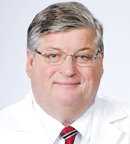
David J. Sugarbaker, MD
DAVID J. SUGARBAKER, MD, was an internationally recognized thoracic surgeon who specialized in the treatment of mesothelioma and complex thoracic cancers. To be recognized as first in a medical finding or procedure is a rare honor; Dr. Sugarbaker received that honor twice, being the first to develop a multimodality therapy for mesothelioma and the first to complete a lung transplant in Massachusetts. Dr. Sugarbaker died on August 29, 2018. He was 65.
A Father’s Influence
DR. SUGARBAKER was born on August 5, 1953, 1 of 10 children who lived on an apple orchard on the outskirts of Jefferson City, Missouri. His father was a cancer surgeon, and his mother was a nurse. His father, who had worked at the National Cancer Institute, ran his own small cancer clinic.
When Dr. Sugarbaker was 13 years old, he began working in the research laboratory that his father had constructed in the family’s garage. “It was my job to tend to the rats and keep the tumor lines going,” he recalled in 2014, when serving as the 94th President of the American Association for Thoracic Surgeons. Along with his work in the lab, Dr. Sugarbaker also assisted his father during operations and doing follow-up visits to postoperative patients. These rich medical experiences at an early age had a profound influence on his life’s view and decision to become a thoracic cancer surgeon.
Road to Becoming a Surgeon
IN 1975, Dr. Sugarbaker entered Cornell University Medical School, receiving his medical degree in 1979 and marrying his longtime girlfriend, Linda, shortly before beginning his surgical internship. He did his surgical residency at Brigham and Women’s Hospital in Boston, after which he relocated to Canada, doing a residency in cardiothoracic surgery at Toronto General Hospital, where he served as Chief Resident. While retaining his position at Toronto General, he would later also become a resident in pediatric cardiac surgery at The Hospital for Sick Children in Toronto.
After completing his residency training, Dr. Sugarbaker returned to the United States, where he was appointed Chief at Brigham and Women’s Hospital. It was there when his career path was set, as he focused mainly on pleural mesothelioma, the disease for which he would cement his legacy. In 1989, he founded and built the first noncardiac division of thoracic surgery in the United States. Under his leadership, the division of thoracic surgery grew quickly, from 1 to about 13 surgeons performing over 3,000 difficult cases annually.
Career in Innovative Surgery Blooms
A YEAR LATER, Dr. Sugarbaker led a team of surgeons in performing the first-ever lung transplant in the state of Massachusetts. This would prove an incredibly vibrant time in his career. In addition to his position at Brigham and Women’s Hospital, Dr. Sugarbaker became Professor of Surgery at Harvard Medical School, where he founded the International Mesothelioma Program; its central goal was to find a cure. Not surprisingly, under Dr. Sugarbaker’s leadership, this program also became the largest of its kind in the nation, attracting patients from across the globe.
In 2014, Dr. Sugarbaker followed an opportunity to the Texas Medical Center, where he founded the new Division of General Thoracic Surgery, the Lung Institute, which integrates medical and surgical treatments for benign and malignant noncardiac thoracic diseases. During this highly active period, he also founded the Mesothelioma Treatment Center.
Dr. Sugarbaker refined his surgical techniques over time and these were emulated worldwide. He also developed methods to perform intraoperative heated chemotherapy and conducted novel clinical trials to establish the appropriate intraoperative agents to be used.
In 2013, he received The Henry D. Chadwick Medal, the highest honor awarded by the Massachusetts Pulmonary Section of the American Lung Association of the Northeast’s Medical and Scientific Branch for meritorious contributions in the study and treatment of thoracic disease.
Collegial Tribute
UPON DR. SUGARBAKER’S death, remembrances of the great doctor poured in. Among them was one from Jacques Fontaine, MD, a thoracic surgeon who trained under Dr. Sugarbaker: “His legacy will endure through the accomplishments of all the prominent thoracic surgeons he has trained. He is the mentor of mentors. His vision, focus, and dedication to advancing the treatment of mesothelioma have influenced an entire generation of thoracic surgeons.” Dr. Sugarbaker is survived by his wife and six children, and several siblings including Dr. Paul Sugarbaker of Washington, DC, who is also a leading surgeon in treating mesothelioma. ■

